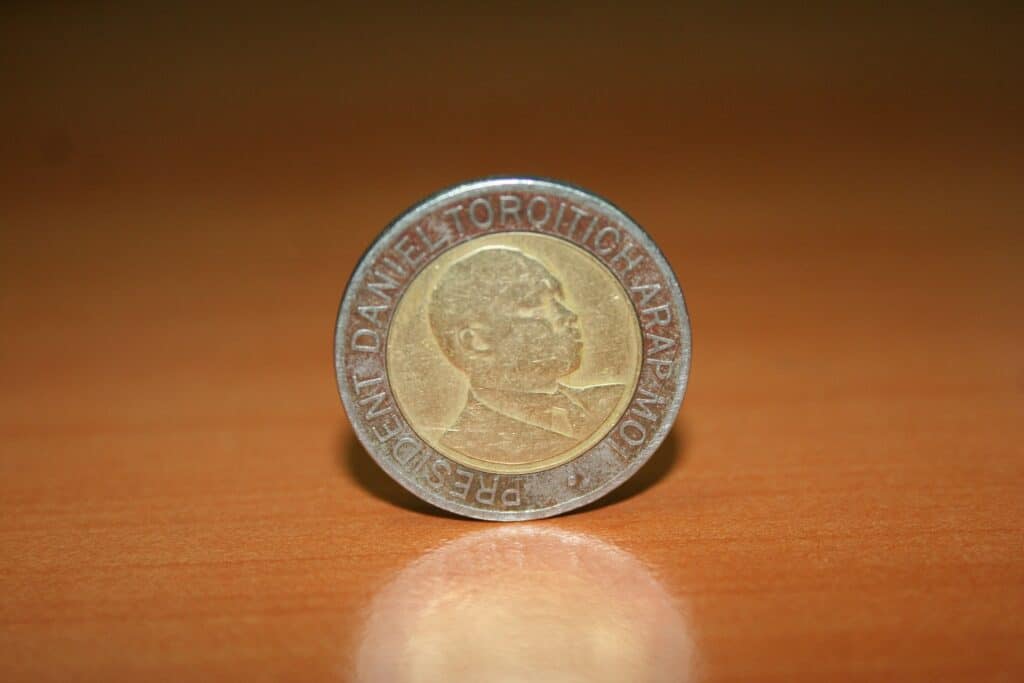Shilling
– Fierce Fiction by Patricia Carrigan –

His name was Shilling, one of the few English words his mother knew when he was born. They spoke Ndebele in his kraal. The white doctors in the bush clinic where his mother gave birth also spoke Ndebele. They laughed at his mother when she said she would call him Shilling.
“Why not call him Pound?” asked the blonde one with the smile in his eyes.
“No,” she smiled, “Pound” is an ugly name. It is worth more than a shilling in money but he will grow up to be important.”
Shilling came to us when I was eight years old. The sky was low and ominous but I felt safe inside watching him in the distance, tramping up our gravel driveway, getting closer and closer. The rain came down like sheets, lashing against the house, pounding the ground only to bounce back upwards off the red earth, creating holes with its force. It was interspersed with sheet lightening right across the sky, illuminating the afternoon darkness with weird, distorted light, making trees and huge rocks look unearthly.
I’d seen him earlier grappling with our gate, never giving a thought to rush down to help him with the cord. As he reached the house, I saw he was wearing a khaki shirt and pants and snow-white sneakers and he did what they always did, he went around the acacia tree on the side, instinctively knowing where to find the back door.
I didn’t see him again for several hours when my mother called me to the kitchen where she introduced us. Although he spoke no English, she told him my name and he smiled. He wore my brother’s shirt and shorts, his feet were bare. His clothes were drying on a rack high near the ceiling in the scullery. My mother asked me to teach Shilling how to set the table for our dinner that evening.
Since coming to Africa my mother set a table with more silverware and china than was necessary. She also acquired a large gong on a wooden stand and a stick with a hard felt head, to beat the gong as dinner time approached. From the day she bought the gong, it didn’t matter where we were, any of us could hear it and head home to clean up for dinner.
Shilling and I set the table. Each armed with a clean kitchen towel to polish every piece as we set it down. Bread knife, fish knife, meat knife, fish fork, salad fork, meat fork. Dessert fork and spoon, water glasses above the knives. Stiff starched linen serviettes. Everything polished and shining. I set one place, Shilling set the rest. I smiled across the table, his face was set with concentration as he worked. Five places on a snow-white linen table cloth. He looked at the gong on the Welsh dresser. I showed him how it worked. He laughed but the gong became as indispensable to Shilling as he became to us.
When he started work for my parents, Shilling thought he was nineteen but didn’t know for sure. My mother taught him everything she knew about cleaning a house and as she was an excellent cook it was in the kitchen where he excelled. Every recipe she knew by heart, Shilling learned by heart. He eventually spoke English but none of us learnt Ndebele. He scrubbed and cleaned our house, gave us our early wake up calls with cups of tea and a tea tray for my parents. He shone our shoes, washed our clothes, made our beds. As the years passed, we had a gardener and at four o’clock each afternoon they both showered and gleamed. Shilling changed from his khaki day uniform to white pants and shirt while the gardener donned crisp khaki after working in garden clothes all day. He helped with the menial tasks of the meal preparation while Shilling cooked and prepared the table. Shilling’s meals were superb. He moved with elegance, shining, black and calm amid our stormy lives. What he thought we never knew. His opinions, feelings and emotions were unknown to us. We showed no curiosity. He was Shilling. He was our houseman, our Jeeves, our cook.
For six weeks out of every year Shilling went home to help his father plant the crops. Where his home was, we only knew the general area, the nearest town. Every time he prepared to go, we were adrift with silent gloom. A week before his departure he went shopping with my parents who bought huge boxes of sugar, maize meal, sugar beans, black beans and masses of candy and cookies. They always bought new, colorful African wool blankets and sometimes they came back with stuffed coir mattresses, rolled and tied with coarse rope.
Shilling would leave on a Saturday with a suitcase and four sturdy cardboard boxes, his mattresses and bags. Everything would be stuffed into the land rover and I’d sit next to my father in the front seat while Shilling would ride in the back. We’d drive to the African bus station where the goods would be reloaded and tied to the top of the bus. Shilling shouted his instructions to the driver. There was always a lot of shouting as more buses were loaded for other remote areas of Rhodesia. Once this ritual was over, my father would give Shilling an envelope and we’d drive away. Shilling would hopefully find a seat on the bus.
He’d always be back within six weeks to the day, year in and year out. The crops had been planted, they were praying for rain, his mother was pregnant again and his brothers and sisters ate all the candy in two days. We knew very little. My mother once told me that Shilling’s parents had called their last baby girl Patricia after me. I was fifteen years old.
One night I went outside to look at the moon, to think of it shining somewhere over my brother’s head far away from home. I walked around the back of the garage, forbidden territory for me. The servants’ quarters, the kia was attached and I couldn’t see into the open windows up near the roof. Standing outside I listened to the gardener and Shilling as they ate their evening meal. I heard Shilling’s voice and then loud laughter. He spoke again. Shilling talked for a long time. The gardener interjected occasionally and together this pair of men, hundreds of miles from their homes and families, sat on the floor around their pots and laughed, talked and conversed as we did. No, more than us. They laughed more. They had more to say. I didn’t understand them but I knew they were exchanging ideas, bouncing thoughts off each other, talking with thought, with intelligence and humor. Standing rooted on a log under the window it
was as though I knew them both for the first time. These were people like me, like my sister, brother and parents. These were men like my father, my father’s friends. Dazed I listened for a long time before creeping away, changed forever. The shifts of understanding, of knowing something had begun a long time ago. This was more of my education. A fragmented cloud passed over the moon. It was Africa. elusive, confusing, mercurial. Unable to hold for long before it slips away, returns quite changed.
Shilling didn’t make my bed after that evening. How could I explain my feeling to my parents who accepted my requests without question? Shilling was confused until I told him that one day, I would leave home and maybe there wouldn’t be a Shilling.
Shilling was with my family for nearly twenty years. I lived in another country and went back to find he had been replaced by Simon. There were only my parents now and the house ran as smoothly as always. They lived in Salisbury, the future Harare. Restaurants and hotels were numerous and my parents had a ritual of going to a very special hotel every Saturday, to sit in the lounge and listen to live jazz. I went with them while I was home. It was splendid in its colonial sophistication and I watched my father whisper to the waiter. Within minutes the huge lounge was still. The waiter returned and stood to attention next to a giant pillar as a tall elegant man in his chef’s attire walked towards us. I gasped. It was Shilling holding out his hands to grasp mine. People whispered and I heard the name Shilling and Chef Shilling all around us.
My parents loved this hotel and knew they needed a new chef. As they personally didn’t need the meals Shilling once cooked, they urged him to apply for the job. The hotel sent Shilling to a Culinary School for six months and in time reservations in the gracious dining room had to be made weeks in advance. Chef Shilling became well known throughout Rhodesia. It was a
success story.
Two years after I last saw Shilling, he went home to help the family with the crops. Their kraal was ten miles from the Mozambique border. War was everywhere around them. Was it terrorists, freedom fighters or Rhodesian army grenades? We never knew. Shilling’s family kraal, the farm animals, the crops and fields were blown up. Shilling and his entire family were wiped from the face of the African soil and we were left with nothing but memories and thoughts of right and wrong and then and now.
About the Author – Patricia Carrigan

Patricia was taken from England to Zimbabwe as a four-year-old. Her father was a civil engineer when the country was called Rhodesia. He was sent, together with his family, to put in more of the infrastructure of that country. She led an exciting, unusual and often troubled life, starting to write essays, memoirs and short stories about her understanding of the country and the people at an early age. She looked on those years as part of her education.
Did you like this story by Patricia Carrigan? Then you might also like:
Danny’s Song
Eliminating Rahiem
Wanderlust
Pieces of You
Like reading print publications? Consider subscribing to the Dreamers Magazine!

Dreamers Writing Prompt Generator
Experience the power of simplicity with our unique writing prompt generator. Designed for writers who crave spontaneity and surprise, our tool delivers one meticulously crafted prompt at a time.

Top 25 Most Popular Manga Right Now
If you’re searching for the most popular Manga right now, this top 25 list is the ideal starting point, whether a beginner or enthusiast.